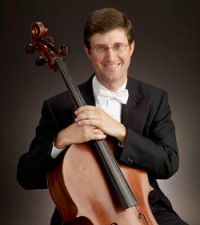by Mike Telin

On Friday, May 30th beginning at 7:00 pm at Trinity Commons, the Broadway School of Music and the Arts (BSMA) presents Old World/New World: An Intimate Evening of Chamber Music. This annual benefit supports BSMA’s music and arts instruction and programming for underserved children and adults.
Hosted by WCLV 104.9 FM’s Bill O’Connell, the evening features Dvořák’s Drobnosti, Op. 75 and the Quintet in E-flat, Op. 97 as well as Mark O’Connor’s folk-inspired FC’s Jig performed by Cleveland Orchestra members Katherine Bormann, Elayna Duitman and Sae Shiragami, violins; Lisa Boyko and Lembi Veskimets, violas; and Bryan Dumm and Alan Harrell, cellos. Tickets are available on the BSMA website or by telephone at 216.641.0630.
Bryan Dumm first became aware of Dvořák’s Drobnosti through his wife. “She is a violinist and I remember hearing her play something called Four Romantic Pieces by Dvořák. Of course she played it with piano and I had just always assumed that was the way Dvořák had conceived it. David Cerone introduced me to the piece in its original instrumentation, for two violins and viola. I’ve had it on the shelf for a while and always wanted to program it, and this concert seemed like the time.”
The inclusion of Dvořák’s Quintet came from Dumm’s desire to juxtapose a work from the composer’s early European style with one from his American period. “Dvořák was in Spillville, Iowa when he wrote it. And there’s just a sound and a color to it that to me is very similar in style to his American Quartet. It as a very mature use of the dance forms.”
Rounding out the concert will be an arrangement for string sextet of Mark O’Connor’s FC’s Jig. “O’Connor’s music shows that we can have our own folk music fit very comfortably in the classical realm and still have the same fun musical qualities that Dvořák was able to deal with so easily.” Dumm adds that he was also trying to figure out how to get all of the players back on stage for a concluding work that would also express the concert’s theme both musically and historically.
“FC’s Jig was originally written for violin and viola, but it’s a work I’ve had in my ear and mind for a while. A friend arranged a sting quartet part to accompany the two solo parts. Even though it is expanded, it still maintains the integrity of O’Connor’s intentions. I think it’s a great piece and really adds a sense of variety. It also shows how Mark O’Connor fits into the development of American music.”
In addition to the great music, Dumm also looks forward to working with WCLV’s Bill O’Connell. “Bill always does a great job. He’ll always ask us our thoughts about learning the pieces and it’s wonderful to see how he can weave it all into his commentary. He’s terrific and has been so generous in doing this year after year for us. It’s a very special part of the concert.”
How did Bryan Dumm first come to the Broadway School? “It started around 13 or 14 years ago when my Cleveland Orchestra colleague, bassist Henry Peyrebrune who was serving on BSMA board at the time, asked me if I would play on a benefit concert for the school. Henry told me about the school and its mission, and I was very happy to help him out with the concert. That led to me performing on the annual benefit concert for the next ten years for him.”
Eventually it was time for Peyrebrune to rotate off the board and he asked Dumm if he would be willing to serve. “I’ve served on a few other boards, but nothing quite like BSMA so it has been a new experience for me.” Dumm explains that although he doesn’t consider himself to be good with balance sheets, his primary responsibility is to continue the tradition of the annual benefit concert started by Peyrebrune.
“It fits into my own gifts and goals so it has been a good match for me. I do try to contribute to the best of my ability and I have enjoyed learning. But I do try to stick to doing what I am qualified to do.” He also believes that the mission of the school makes it quite easy for him to attract his orchestra colleagues to donate their time and talents. “I just have to give a brief description of the school and they’re very willing to help out.”
Published on ClevelandClassical.com May 27, 2014.
Click here for a printable copy of this article.



